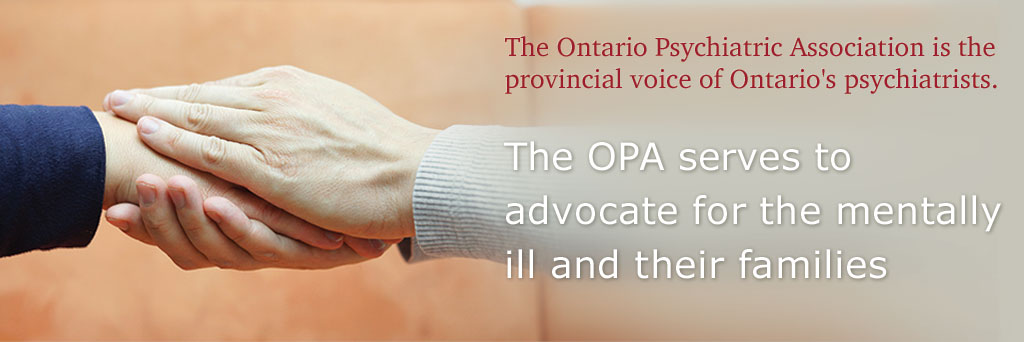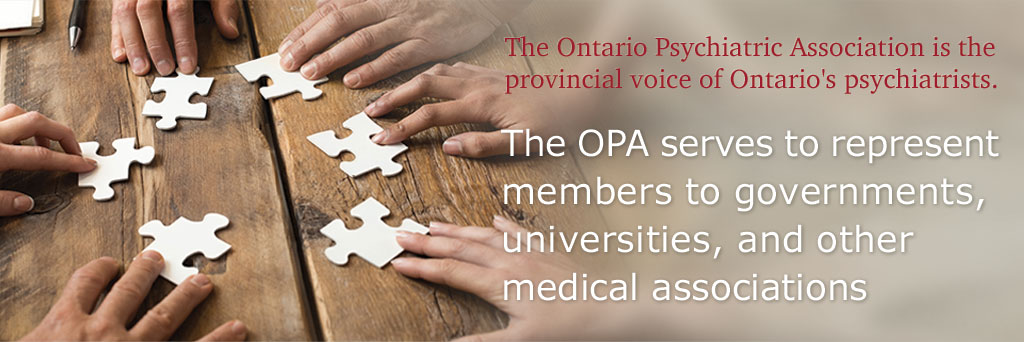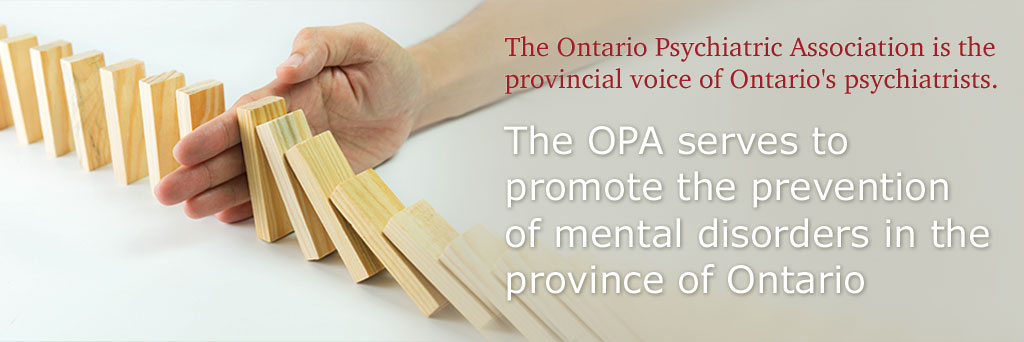News & Updates
The OPA Opposes Ontario’s Proposal to Expand Prescribing to Psychologists -- Send the Government Your Feedback!
October 2025
The Ontario Government is seeking input on its proposal to expand the privileges of prescribing medications and ordering tests to psychologists. The OPA posted its statement, which outlines its concerns about patient safety and how this change lacks systems-based planning and will not improve access to care for Ontarians. If you agree with the OPA's position, please let the government know your thoughts! Comments are open until November 3, 2025.
OPA Statement on Government Proposals to Expand Health-Care Scopes of Practice
September 2025
On September 17, 2025, the Ontario Government proposed to grant prescribing privileges to psychologists and to extend prescribing privileges of pharmacists.
Improving access to timely mental health and substance use care and treatment is one of the priority initiatives of the Ontario Psychiatric Association (OPA). The government’s proposal to extend the responsibility of prescribing psychiatric medications and interpreting medical investigations to professionals without medical training comes as a surprise, and with disappointment, that the OPA—representing frontline Ontario psychiatrists—was not consulted by the government.
While the OPA fully supports new ideas in Ontario to improve care, we also want to ensure changes address the underlying barriers to access and meet the demands of patient complexities safely. The OPA is concerned about the government’s under-appreciation of the comprehensive training and knowledge of psychiatrists and other physicians. Training for independent psychiatric practice requires a minimum of 8-9 years to ensure expertise to differentiate between medical and psychiatric diagnoses, understand pharmacokinetics and pharmacodynamics, manage medical comorbidity and medication-related syndromes, utilize physical examinations and multiple medical investigations, and consider the unique needs of patient populations across different life stages. Safe prescribing requires experience in these domains and requires the skills gained from rigorous training in the medical model.
The government’s proposals to expand the scope of practice for non-physicians in mental health and substance use care neglect the existing gaps in our fragmented health system. Shifting care to privately funded alternatives is not an investment by the government and ignores creating equitable solutions. The headline of providing faster access to care obscures and minimizes the potential risks to patients and the addition of unintended challenges to the system.
Ontarians deserve safe, high-quality care and this demands infrastructure and care coordination to support healthcare professionals. We urge the government to consult with psychiatrists and other physicians to better inform their decision-making in crafting sustainable, safe and viable alternative solutions to truly improve access to care across the province.
Joint OPA & CAAP Addictions Conference
August 2025
The Ontario Psychiatric Association and the Canadian Academy of Addiction Psychiatry present a key conference for clinicians working in substance use and concurrent disorders on Saturday, November 22, 2025. Join us for a dynamic day of learning, networking, and collaboration with leading experts in the field of addictions psychiatry. This conference offers an excellent opportunity to explore emerging issues, strengthen clinical skills, and connect with colleagues from across the province. Learn more and register here.
OPA Letter-Writing Campaign
Advocate legislative change to allow earlier access to care for your loved ones with severe mental illness
August 2025
Current mental health laws impede early access to psychiatric treatment, leading to worse health outcomes for incapable persons with severe mental illness who are denied rights to health. The OPA calls for legislative change to better meet the needs of Ontarians with severe mental illness and the families supporting them.
The OPA's Mental Health Law Reform Task Force continues to advance mental health law reform and has updated the OPA's Mental Health Law Proposals.
- Permit Treatment Pending Appeal under the Health Care Consent Act Sec 18.
- Remove past response to treatment from Form 3 Box B Involuntary Admission Criteria, under the Mental Health Act Sec 20 (1.1).
- Change involuntary admission criterion of "serious bodily harm" to "serious harm" and concomitantly, narrow Ontario's Mental Health Act definition of "mental disorder" to denote serious mental illness, under the Mental Health Act Sec 1; Sec 20 (1.1; 5).
- Extend a first involuntary admission to up to 30 days, under a Form 3 (MHA Sec 20 [4]).
Read the OPA's detailed Mental Health Law Reform Proposals and engage on social media
Award Winners Announced
May 2025
The OPA Board is pleased to announce the recipients of this year's awards, continuing our tradition of recognizing and celebrating outstanding contributions in the field of mental health. The OPA Mental Health Advocate of the Year Award is presented annually to a non-physician member of the public who has made a major contribution to the understanding of mental illness and its impact on individuals in society. This year's recipient is Yusuf Faqiri. The OPA Breakout Community Psychiatry Advocacy Award recognizes contributions to the profession of psychiatry and to the public by a community psychiatrist engaging in grassroots advocacy in their local area. This year's recipients are Dr. Andrew Howlett and Dr. Samuel Law.
Introducing the OPA's new Chair-Elect: Dr. Shabbir Amanullah
September 2024
 The OPA is delighted to announce that Dr. Shabbir Amanullah is the OPA's new Chair-Elect. Dr. Amanullah was formerly an OPA Board member. He is the Chair and Clinical Director in the Division of Geriatric Psychiatry at Queen's University and Providence Care Hospital in Kingston, Ontario. His work with the OPA includes being an active member of the Education Committee, organizing continuing medical education events for our members and other professionals.
The OPA is delighted to announce that Dr. Shabbir Amanullah is the OPA's new Chair-Elect. Dr. Amanullah was formerly an OPA Board member. He is the Chair and Clinical Director in the Division of Geriatric Psychiatry at Queen's University and Providence Care Hospital in Kingston, Ontario. His work with the OPA includes being an active member of the Education Committee, organizing continuing medical education events for our members and other professionals.
Mental Health Law Reform Updates
September 2024
The OPA Mental Health and Law Reform Task Force has had a busy summer with presentations to the Ontario Family Caregivers Advisory Network and at the International Academy of Law and Mental Health Congress in Barcelona. See the Scientific Program here. The OPA is advocating to change Ontario's laws so that treatment pending court appeal can be provided for patients found incapable after a Consent Capacity Board hearing, and also for a change to involuntary hospitalization that allows for more people to access hospital care when they are incapable and at risk for mental or physical deterioration. The OPA planned the Congress sessions to focus on Ontario's mental health laws and included presentations by the Associate Minister of Mental Health and Addictions, Minister Michael Tibollo.
Canada not ready to expand MAID for mental disorders
January 2024
In a brief to the Special Joint Committee on MAID, the OPA identified Canada's medical system as being unprepared to safely expand MAID for mental disorders as sole underlying medical condition (MD-SUMC), under the current Federal legislative framework.
The OPA's recent study on perspectives of Canadian psychiatrists and psychiatry residents found that 61% of participants disagreed that MAID should be permitted for MD-SUMC, while 80% disagreed that the Canadian medical system is prepared to safely support the expansion of MAID for MD-SUMC by March 17, 2024.
Read the OPA's preliminary study findings.
OPA Letter-Writing Campaign
Advocate legislative change to allow earlier access to care for your loved ones with severe mental illness
January 2024
Current mental health laws impede early access to psychiatric treatment, leading to worse health outcomes for incapable persons with severe mental illness who are denied rights to health. The OPA calls for legislative change to better meet the needs of Ontarians with severe mental illness and the families supporting them.
The Ontario Psychiatric Association proposes 3 reforms to Ontario mental health law:
- Permit Treatment Pending Appeal under the Health Care Consent Act
- Remove past response to treatment from Form 3 Box B Involuntary Admission Criteria, under the Mental Health Act
- Extend a first involuntary admission to up to 30 days, under a Form 3
Read the OPA's detailed Mental Health Law Reform Proposals and engage on social media
OPA Statement on Uninsured Program Cuts
March 2023
The Ontario Psychiatric Association is disappointed by the Ontario government's decision to stop health care coverage for all by ending the Physician and Hospital Services for Uninsured Persons Program, effective March 31, 2023.
This unilaterally-made decision will prevent uninsured and OHIP-ineligible patients from accessing health services, including hospital-based care. Physicians will not be remunerated by the ministry for providing medically and morally necessary care to the uninsured. Many populations including undocumented migrants and persons with low socioeconomic status or precarious housing will be further marginalized — especially those with mental illnesses that would worsen without care. The consequences will be devastating health outcomes and increased demands on our strained health and social services systems.
OPA requests that the ministry reconsider and extend the program temporarily until a better solution is found, or the program is made permanent.
OPA Call to Delay Expansion of MAiD for Mental Disorders
December 2022
Medical Assistance in Dying (MAiD) is scheduled to expand in March 2023 to include cases where mental disorder is the sole underlying medical condition (MAiD MD-SUMC).
In May 2022, the Canadian Expert Panel on MAID and Mental Illness released its final recommendations "with the recognition that more work will need to be undertaken by other actors – regulators, professional associations, and institutional committees – who have the content expertise to develop specific guidelines for practitioners." The report proposes that incurability and irreversibility of mental illness be assessed on a case-by-case basis.
An expert group formed in September 2022 is tasked to develop MAiD practice standards is still working on initial drafts and consultations, and forecasts completing a report by February 2023. Federally funded physician training on MAiD for sole mental illness remains to be completed and launched.
The OPA calls to delay the expansion of MAiD for mental disorders. Without sufficient time for consultation, development of evidence-based recommendations and safeguards, and availability of provider training, the expansion of MAiD by March 2023 may be premature. This implementation demands an approach of utmost sensitivity and integrity, with robust scientific and ethical guidance, and considerations of structural vulnerabilities disproportionately affecting those with mental disorders.
Dec 1, 2022: the Globe and Mail highlights calls for delay of expansion of MAiD by organizations including the OPA
Dec 2, 2022: Dr Angela Ho, OPA President, speaks on CBC Ottawa Morning about concerns with expansion of MAiD by March 2023
OPA Statement on the War in Ukraine
March 1, 2022
The OPA has been following the evolving war in Ukraine and wishes to express support to the innocent people being impacted by it. We stand with the people of Ukraine and condemn this act of war.
OPA Condemns Islamophobia and Anti-Muslim Hatred
June 14, 2021
OPA Champions Equitable Access to Mental Health Care for Diverse Populations
WEDNESDAY, APRIL 7, 2021
As psychiatrists and healthcare professionals, the OPA champions equitable access to mental health support and services. Our Ontario population is diverse, with 29.1% of the population being immigrants, 3 in 10 being of visible minority backgrounds, and over 3.8 million people whose mother tongue is other than English or French. The Mental Health Commission of Canada has noted that many immigrants, refugees, and ethnoracial groups in Canada continue to encounter barriers towards seeking and obtaining psychiatric help, including challenges in provider-patient interactions, service accessibility, and language barriers. In Ontario, data has specifically highlighted disparities based on ethnic differences in mental illness severity and service utilization.
One of the Mental Health Commission of Canada's strategic directions includes a focus on improving mental health services and supports for immigrant, refugees, ethnocultural and racialized groups (IRER). A concerted effort is needed across social and healthcare sectors to address the underlying racism, discrimination, and other structural inequities impacting on the health and well-being of the diverse populations we serve.
Cultural competence and cultural safety are paramount to meeting these challenges at clinical, organizational, and systemic levels. This includes promoting training in anti-oppression, anti-racism, cultural competence, and cultural safety; enacting healthcare policies that promote equitable access and care; and developing mental health practices, programs, and services that are responsive to the cultural and linguistic needs of the diverse communities, including ethnospecific programs.
Some longstanding cultural and linguistic-specific mental health services have been developed for various culturally diverse populations, with some numbering in the hundreds of thousands in Ontario. These collaborative, multidisciplinary clinics have served their respective communities by using a team-based approach and engaging in hospital-community partnerships. As an efficient and exemplary model of care, these best practices need to be protected, promoted, and adapted for other diverse populations, tailored for their specific needs and grounded in their local communities.
The OPA has become aware of expressed concerns from communities that some of these clinics in the province have already been closed or are in the process of being restructured or shut down. As these types of programs are uniquely designed to deliver services to underserved populations, they are also the most vulnerable to restructuring changes and cuts due to their relative lack of visibility, support, and active championship. With race-based violence on the rise, the loss of safe spaces and vital culturally-concordant treatment supports for marginalized populations will only further compound suffering.
From a system perspective grounded in equity, diversity, and inclusion principles, the OPA advocates for continuous commitment, investment, and support for culturally-competent programs throughout the province, as we must work in solidarity towards addressing the mental health needs of all Ontarians.
References
Chiu, M., Amartey, A., Wang, X., & Kurdyak, P. (2018). Ethnic Differences in Mental Health Status and Service Utilization: A Population-Based Study in Ontario, Canada. The Canadian Journal of Psychiatry, 63(7), 481-491.
Chiu, M., Lebenbaum, M., Newman, A. M., Zaheer, J., & Kurdyak, P. (2016). Ethnic Differences in Mental Illness Severity: A Population-Based Study of Chinese and South Asian Patients in Ontario, Canada. The Journal of Clinical Psychiatry, 77(9), e1108-e1116.
Diamond, L., Izquierdo, K., Canfield, D., Matsoukas, K., & Gany, F. (2019). A Systematic Review of the Impact of Patient-Physician Non-English Language Concordance on Quality of Care and Outcomes. Journal of General Internal Medicine, 34(8), 1591-1606.
Fung, K., & Guzder, J. (2018). Canadian Immigrant Mental Health. In D. Bhugra & A. Ventriglio (Eds.), Mental Health and Illness in Migration: Mental Health and Illness Worldwide. Singapore: Springer.
Fung KP, Lo HT, Srivastava R, Andermann L. Organizational Cultural Competence Consultation to a Mental Health Institution. Transcultural Psychiatry, 2012; 49(2): 165-184.
Kirmayer L, Fung K, Rousseau C, Lo HT, Menzies P, Guzder J, Ganesan S, Andermann L, McKenzie K. (2020). Guidelines for Training in Cultural Psychiatry. The Canadian Journal of Psychiatry.
Mental Health Commission of Canada. (2016). The Case for Diversity: Building the Case to Improve Mental Health Services for Immigrant, Refugee, Ethno-cultural and Racialized Populations. Ottawa, ON: Mental Health Commission of Canada.
Statistics Canada. (2017). An increasingly diverse linguistic profile: Corrected data from the 2016 Census. Ottawa, Ontario.
https://www150.statcan.gc.ca/n1/daily-quotidien/170817/dq170817a-eng.htm
Statistics Canada. (2017). Focus on Geography Series, 2016 Census. Statistics Canada Catalogue no. 98-404-X2016001. Ottawa, Ontario. Data products, 2016 Census. https://www12.statcan.gc.ca/census-recensement/2016/as-sa/fogs-spg/Facts-PR-Eng.cfm?TOPIC=7&LANG=Eng&GK=PR&GC=35
Yousif, N. (2021, March 25). Long-standing Portuguese mental health clinic is set to close, raising alarms for the future of language-specific services in Toronto. The Toronto Star. https://www.thestar.com/news/gta/2021/03/25/long-standing-portuguese-mental-health-clinic-is-set-to-close-raising-alarms-for-the-future-of-language-specific-services-in-toronto.html
OPA Denounces Anti-Asian Racism
THURSDAY, APRIL 1, 2021
In the face of brazen acts of violence against North Americans of Asian descent including the horrific shootings in Atlanta, the OPA strongly denounces anti-Asian racism and discrimination in all of its forms.
While there has been a long history of anti-Asian racism and systemic inequities dating back to the founding of Canada as a nation, it has often been masked by the model minority myth. With the pandemic, Asian communities have been blamed and treated as foreigners. Anti-Asian discrimination and hate crimes have dramatically increased, including violent attacks against women and the elderly.
In 2020, a national survey found 50% of Chinese Canadians were insulted because of the pandemic, and 43% were personally threatened or intimidated. The Chinese Canadian National Council of Toronto documented 1150 cases of racist attacks from March 10, 2020 to February 28, 2021 reported through web portals, with about 40% of the cases being from Ontario. Alarmingly, about 11% of the attacks involved violent assault or unwanted physical contact and about 10% involved being coughed on or spat at.
We recognize the tremendous destructive impact that racism has on the safety, mental health, and wellbeing of Asian individuals and communities. This is especially concerning in the context of unmet mental health needs for Asian Canadian populations, including poor access, language barriers and insufficient services, leading to significant mental health disparities in Ontario.
As psychiatrists and mental health professionals, the OPA stands in solidarity with Asian communities. We call for anti-stigma advocacy and initiatives, individually and collectively; support for culturally competent mental health care for diverse communities; and an end to all forms of xenophobia, racism, and discrimination.
Bell Let's Talk Day
THURSDAY, JANUARY 28, 2021
Dr. Renata M. Villela, OPA President, and Dr. Javeed Sukhera, OPA Past President, participated in a media briefing about the impact of the COVID-19 pandemic on mental health. Portions were featured on CP24 at: https://www.cp24.com/video?clipId=2126513 and in The Globe and Mail here.
Dr. Yusra Ahmad, OPA Council Member, was invited to take over @TransplantCTV's Twitter and IG accounts that day to share her innovative work on Mindfully Muslim.
Ontario Psychiatric Association Anti-Racism Statement
MONDAY, JUNE 8, 2020
The Ontario Psychiatric Association (OPA) unequivocally condemns all forms of anti-Black Racism and stands in solidarity with those standing up and speaking up about the injustices faced by Black, Indigenous, and People of Colour in Ontario, Canada, and the Global Community. Psychiatrists have an important role to play in addressing the disproportionate impact of violence and coercion on patients of colour. We must not only acknowledge and reckon with the impact of systemic racism on our most vulnerable and marginalized patients, but we must also rise up and do the work to dismantle oppressive structures and work towards a more just and equitable healthcare system. The OPA is committed to addressing the issue of equity, diversity, inclusion, and belonging through words and deeds as we move forward as a profession and as a community.
On behalf of the OPA Council,
Javeed Sukhera
OPA President, March 2019 - June 2020





 Ontario Psychiatric Association is delighted to welcome Dr. Javeed Sukhera to the position of President for 2019.
Ontario Psychiatric Association is delighted to welcome Dr. Javeed Sukhera to the position of President for 2019.